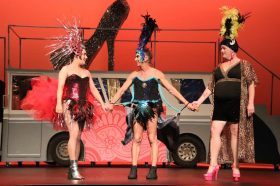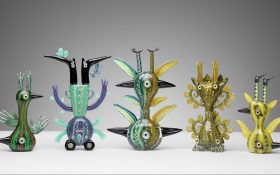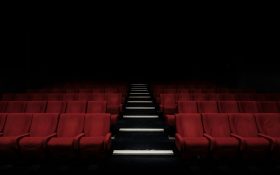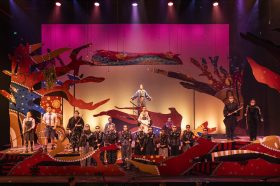I’m not particularly fond of musicians making noise. Which may come as a surprise to you, dear reader, given that I am, after all, a music critic, but I think we may misunderstand each other. It’s the musicians themselves, as opposed to their instruments, that I do not like making noises. Every now and then, especially in more intimate concerts, one will come across a violinist who likes to take a sharp breath before each phrase, for instance, in effect almost adding another note to the music where a note should not be, and, music being as much about silence as it is about a lack of it, it can ruin one’s enjoyment. (Perhaps I am too pedantic about this, but it is, as they say, part of the magic that is me.) I’m all for tormented faces, though, all for a hundred replicas of Munch’s Scream as the climax of a symphony is reached, but as long as they, like the painting, stay silent. So it was with some surprise that Pieter Wispelwey’s performance, full of just such aural disturbances, didn’t annoy me at all.
As you may gather, this was a rather special concert. Indeed, there’s been a spate of them in Sydney recently; more of them than usual in a row, I think, in the last week and a bit. An aligning of the stars, if you will. (Or perhaps it’s merely that the Prozac is finally starting to take effect – misanthropic creatures that critics are, living in our dank lairs torturing kittens – and it’ll be all harmonies and flawlessness from hereon out.) It began, for me anyway, with the Australian Chamber Orchestra’s Barry Humphries’ Weimar Cabaret on 24 April, an extended and edgy panoply of quasi-theatrical wonder, before moving onto the Sydney Philharmonia Choir’s best concert of late – Remember Me – with its tight program and soaring voices, then, in case there was any doubt about the power of song, there was An Evening with Bryn Terfel – and a better voice will not be heard for some time to come, one suspects. And now, Northern Lights with the Sydney Symphony. (It’s the concentration of quality that makes me so effusive, and why not? For the time will come, and very soon, no doubt (for it always does) when the lull will return and quash the spirit to a more manageable size.)
So why was this concert special? Well, to start with, it was all good. There’s rarely a concert I attend that makes me feel like I’ve completely wasted my time, but often it’s more a case of truly enjoying half the pieces, and sitting peaceably through the rest, than being utterly fulfilled every time. (Think, dear reader, to your return trip home with your companion, as one of you says something to the effect of ‘I enjoyed the Beethoven much more than the Mozart,’ or ‘I liked the concerto better than the symphony,’ or ‘did you know that the Opera House no longer sells vanilla ice cream, but only chocolate?’ (This is true, by the way – about the ice cream – and an extremely puzzling and infuriating decision, in my view. One is a fan of vanilla. Someone should start a petition.)) Secondly, the conductor, Thomas Ades, was to be leading the orchestra in a performance of one of his own pieces, which is always a boon. And then there was the noise from Wispelwey.
But Beethoven came first, both in the program, and in the history of time. We heard his Namensfeier (Name Day) Overture, which was energetically conducted and played. And then there was Andrew Ford. (This concert was part of the ‘Meet the Music’ series, which means three things: a 6:30pm starting time, Andrew Ford, and lots of schoolkids in the audience.) He introduced Lutoslawski’s Cello Concerto to us, telling us how there was a repeated D from the cello at the start, held for just ‘a bit longer than is comfortable for the audience’. We were told that, given the note being played, the cellist’s left arm was not needed, and so would be hanging by his side. And we were given many other titbits – Andrew Ford is always interesting, and always reading with a pithy remark about the universal properties of music to end his little speeches. Wispelwey was the cellist, and he did have his arm hanging by his side, but the moment wasn’t too long for this audience member, mainly, I think, because Wispelwey is a very canny performer. He looked, to be perfectly honest, slightly eccentric, in a kind of well-groomed-but-absent-professor type of way – happy and not caring what others think, but ready to focus intensely and single-mindedly on something when required. Playing the repeated D, he combated the possible impatience of the audience by, part way through, slowly lifting his left arm up into position on the fingerboard, giving us a visual representation of just how much more we had to endure. And I think this, and other parts of his performance, helped a great deal in allowing the audience to connect to the music. (And he also gave a remarkable performance, too.)
Indeed, Wispelwey managed to do what all soloists should strive for when playing with the orchestra silent. For cadenzas and the like to work and work extremely well, it needs to feel like what we’re hearing is a conscious will against the void, an emotion against the silence, as it were – a spark of humanity amidst the meaninglessness. The common compliment of a great performance is to say that ‘it sounded as if he was creating it as he went along,’ or something to that effect, and that was the case here as well. (If one ever wanted a bumper sticker to express this, try ‘if it sounds rote it just won’t float’.) But what about the other noises, I hear you ask? For there was a curious facet of his performance, namely that, in the particularly vigorous sections, where he attacked the cello in a flurry of notes that lasted a second or two at a time, Wispelwey would often let out guttural noises, primitive noises, almost as if he were manhandling the music into line. And I found, quite surprisingly, that it added to the charm of the performance, although perhaps the same can’t be said for the schoolboys behind me, who felt the need to mimic the noises – during the music – to their friends. (Ah, the foibles of youth. At least they weren’t coughing.) The music, too, was somewhat special, in that certain sections were comprised of notes that were left to the discretion of the musicians. (The idea being that, as long as the particular notes are played at some point, the harmony will still be sounded, but in a way that isn’t like any other.) Needless to say, it was a magnificent performance. A ‘journey,’ as Andrew Ford would no doubt say.
After the interval was Ades’ Polaris – Voyage for Orchestra, which involved most of the brass players – except for the principal tuba – being scattered about the Concert Hall, up, from what this critic could see, behind the boxes. The idea was to surround the audience with sound. The piece itself, which has a very starry travel-to-the-centre-of-a-galaxy bent, was exciting and hugely impacting, with its few swells and couple of subsidences. (One has fond memories of a violin concerto of Ades’ being performed by the symphony last year, so one hopes to hear more of his music in the future.)
Finally there was a late work of Sibelius’, his Symphony No.6, Op.104, which was notable for the perfect choice of tempos, as well as its engaging evolution. Ades got the best out of the Sydney Symphony, and one feels the Sydney Symphony got the best out of him. A brilliant concert.
Rating: 5 stars out of 5
Northern Lights
Sydney Symphony
Thomas Ades (conductor)
Pieter Wispelwey (cello)
Ludwig van Beethoven – Namensfeier (Name Day) Overture
Witold Lutoslawski – Cello Concerto
Thomas Ades – Polaris – Voyage for Orchestra
Jean Sibelius – Symphony No.6, Op.104
Concert Hall, Sydney Opera House
2 May





